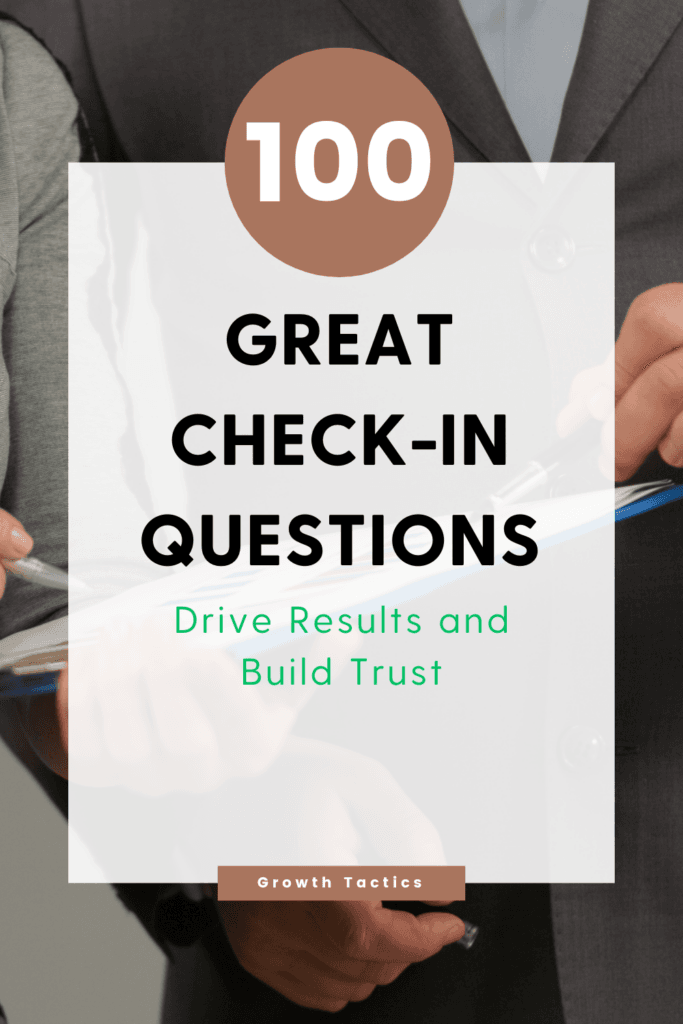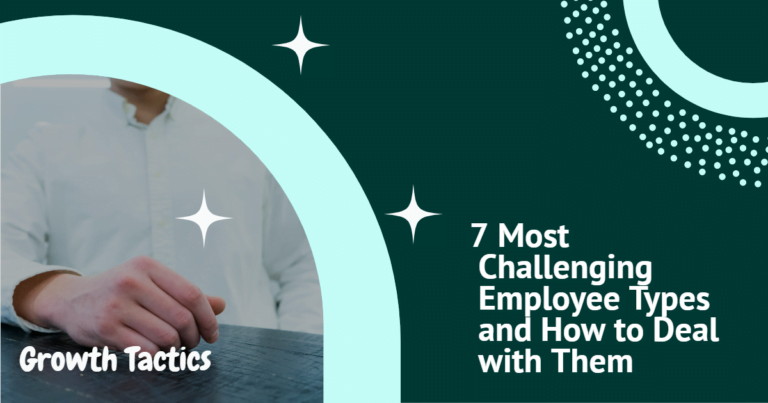Ever felt like your team meetings were missing something? Like you’re not quite connecting with your teammates?
You’re not alone. As a leader, I’ve been there too. But I’ve found a secret weapon: the right check-in questions.
These aren’t just any questions, they’re powerful tools that can transform your team’s productivity, boost morale, and build real trust.
Whether leading a remote team or sitting across the table, these questions will help you break through barriers and get to the heart of what matters. Let’s discover how to make every check-in count.
Jump To Section
Why Check-In Questions Matter: The Secret Sauce of Successful Teams
You might be thinking, “Aren’t they just small talk?” Trust me, they’re so much more.
I’ve seen firsthand how these simple questions can turn a struggling team into a powerhouse. Let me show you why they matter.
The Power of Connection in Team Meetings
Picture this: You walk into a meeting room (or log into a video call), and instead of diving straight into work, you ask, “What’s the best thing that happened to you this week?” Suddenly, the energy shifts. People start sharing, smiling, and connecting. That’s the magic of check-in questions.
I remember when I first started using them. My team was like a bunch of islands, everyone doing their own thing, not really talking. But these questions? They built bridges. They helped us see each other as real people, not just coworkers.
How Check-Ins Boost Employee Engagement
Here’s the thing: engaged employees are happy employees. And happy employees get stuff done. Check-in questions show your team that you care about them as people, not just workers.
Try this: At your next meeting, ask everyone, “What’s one thing you’re proud of accomplishing this week?” Watch how people light up when they share their wins. It’s not just feel-good stuff, it makes people more excited about their work.
Ready to give it a shot? Your next great team meeting is just one good question away. What will you ask?
Setting the Stage for Effective Check-Ins: Your Guide to Meaningful Conversations
Now that we know why check-ins matter, let’s talk about how to make them work. It’s not just about asking questions, it’s about creating the right environment. Trust me, I’ve learned this the hard way.
Creating a Safe, Inclusive Environment
Remember when you were a kid and felt scared to speak up in class? That’s how some of your team members might feel. Your job is to make them feel safe.
I once had a team member who never spoke up. Turns out, she had great ideas but was afraid of being judged. So, I started each meeting by saying, “There are no bad ideas here.” She eventually began to open up, and her ideas helped us solve some big problems.
Here’s what you can do:
- Thank people for sharing
- Listen without interrupting
- Encourage different viewpoints
But remember, what works for me might not work for you. Find your own way to make your team feel safe.
The Importance of Consistency in One-on-One Meetings
Consistency is key. It’s like watering a plant, you can’t do it once and expect it to thrive.
I used to skip one-on-ones when things got busy. Big mistake. I missed out on important issues, and my team felt ignored. Now, I treat these meetings like they’re sacred. Rain or shine, busy or not, we have our check-ins.
Try this:
- Schedule regular check-ins and stick to them
- Come prepared with questions
- Follow up on previous discussions
Again, find what works for you and your team. Maybe weekly works, or maybe bi-weekly is better. The important thing is to be consistent.
Quick Tips for Remote Work Check-Ins
Remote work can make check-ins tricky. But with a little effort, you can make them just as effective as in-person meetings.
Here are some ideas:
- Use video calls when possible
- Start with a fun icebreaker
- Be mindful of time zones
Now, it’s your turn. How will you set the stage for effective check-ins? Remember, there’s no one right way. Your team is unique, and your approach should be too.
Think about your next check-in. What can you do to make it more meaningful? How can you create a space where your team feels heard and valued?
100 Great Check-In Questions
Now let’s get to some example check-in questions to get your creative juices flowing.
Work Progress and Goals
- What’s your biggest win this week?
- What’s one task you’re proud of finishing?
- Are you stuck on anything? How can I help?
- What’s your main goal for today?
- Have you learned anything new lately?
- What’s one thing you want to improve in your work?
- Are your current tasks aligned with your bigger goals?
- What’s been your biggest challenge this week?
- Do you need any resources to do your job better?
- What’s one thing you’d like to accomplish by our next check-in?
Personal Well-being
- How are you feeling today?
- What’s one thing you’re looking forward to?
- Have you taken any breaks today?
- What’s making you smile lately?
- Are you getting enough rest?
- What’s one thing you do to relax after work?
- How’s your stress level right now?
- What’s one thing you’re grateful for today?
- Have you tried any new self-care practices lately?
- What’s one thing you could do today to boost your mood?
Team Dynamics
- How’s your relationship with your teammates?
- Do you feel heard in team meetings?
- What’s one thing our team does well?
- Is there anyone on the team you’d like to work with more?
- How can we improve our team communication?
- Do you feel supported by your colleagues?
- What’s one team tradition you’d like to start?
- How can we celebrate team wins better?
- Is there a skill on our team that we’re not using enough?
- What’s one way we could make our team meetings more effective?
Personal Growth
- What’s one new skill you’d like to learn?
- Have you read any good books or articles lately?
- What’s one area you feel you’re growing in?
- Is there a conference or workshop you’d like to attend?
- What’s one habit you’re trying to build or break?
- Who inspires you right now?
- What’s one thing you’ve done recently that pushed you out of your comfort zone?
- How are you investing in your personal development?
- What’s one goal you’re working towards outside of work?
- Is there a new responsibility you’d like to take on?
Work-Life Balance
- How’s your work-life balance feeling?
- What’s one fun thing you did this week?
- Are you able to “switch off” from work at the end of the day?
- How’s your family doing?
- What’s one non-work activity you’re excited about?
- Do you feel you have enough time for your hobbies?
- How do you separate work time from personal time when working from home?
- What’s one thing you do to make your workspace more enjoyable?
- Are there any work-related stresses affecting your personal life?
- What’s one way we could improve work-life balance for the team?
Career Development
- Where do you see yourself in a year?
- What skills do you want to develop for your career growth?
- Is your current role aligned with your career goals?
- What’s one project you’d love to work on?
- Do you feel challenged enough in your current role?
- What’s one way I can better support your career growth?
- Are there any parts of the company you’d like to learn more about?
- What’s one leadership skill you’d like to improve?
- How can we help you progress in your career path?
- Is there a role model in the company whose career path interests you?
Feedback and Communication
- Is there any feedback you’d like to give me?
- How can I communicate with you more effectively?
- Do you feel comfortable sharing your ideas with the team?
- What’s one thing we could do to improve our feedback process?
- Is there anyone you’d like to give a shout-out to?
- How can we make our one-on-ones more valuable?
- Do you feel you’re getting enough feedback on your work?
- What’s one way we could improve team transparency?
- Is there any information you feel you’re missing?
- How can we better recognize and celebrate individual contributions?
Company Culture and Values
- How well do you think we’re living up to our company values?
- What’s one thing you love about our company culture?
- Is there a company value you’d like us to focus on more?
- How can we make our workplace more inclusive?
- What’s one company tradition you really enjoy?
- Do you feel the company supports your professional growth?
- How can we better embody our mission in our daily work?
- What’s one way we could improve employee engagement?
- Do you feel proud to work here? Why or why not?
- How can we better support work-life balance as a company?
Innovation and Creativity
- What’s one new idea you’ve had recently?
- How can we encourage more creative thinking in our team?
- Is there a process you think we could improve?
- What’s one crazy idea that just might work?
- How can we better support innovation in our daily work?
- What’s one industry trend you think we should pay attention to?
- Is there a new tool or technology you’d like us to explore?
- How can we create more space for experimentation?
- What’s one way we could approach our work differently?
- If you had a magic wand, what’s one thing you’d change about how we work?
Personal Satisfaction and Purpose
- Do you feel your work has purpose?
- What’s one way your job aligns with your personal values?
- How satisfied are you with your current role?
- What’s one thing that would make your job more fulfilling?
- Do you feel your strengths are being fully utilized?
- What’s one way we could make your work more meaningful?
- How does your work contribute to our larger mission?
- What motivates you to come to work each day?
- Is there a part of your job that you find particularly rewarding?
- How can we help you find more purpose in your daily tasks?
Remember, these questions are just starting points. The real magic happens when you use them to spark meaningful conversations. Trust your instincts, be genuine, and really listen to the answers. That’s how we grow together and build stronger, more purposeful teams.
The Power of Active Listening
Remember when you were a kid and felt like grown-ups never really listened? Well, as leaders, we can’t fall into that trap. Active listening is your secret weapon. It’s not just about hearing words; it’s about truly understanding what your team members are saying.
I once had a team member who seemed disengaged during meetings. Instead of assuming the worst, I asked, “How are you feeling about our projects right now?” Then I shut up and really listened. It turns out they had great ideas but felt overshadowed by louder voices. By truly listening, I uncovered a goldmine of creativity we’d been missing out on.
Try this: Next time you ask a question, count to five in your head before responding. You’ll be amazed at what people share when given a little extra time.
Building Trust Through Follow-Ups
Following up on answers isn’t just polite, it’s a trust-builder. When you remember what someone said and ask about it later, you’re showing that you care. It’s like watering a plant; a little attention helps relationships grow.
For example, if someone mentions they’re working on a tough project, make a note. Next time you chat, ask how it’s going. Simple, right? But it makes a big impact.
Flexing Your Style for Different Personalities
We’re all unique, and that’s what makes teams awesome! Some folks love to chat, while others prefer to keep things brief. Pay attention to how your team members communicate, and adjust your style to match.
I’ve found that using a mix of open-ended and specific questions works well. Something like, “What’s on your mind today?” for the chatty types, and “How’s the Johnson project coming along?” for those who like to get straight to the point.
Tailoring Questions for Every Situation
One size doesn’t fit all when it comes to check-ins. Let’s break it down:
- One-on-ones: Get personal. “What’s your biggest win this week?”
- Team meetings: Think big picture. “How can we support each other better?”
- Remote work: Focus on connection. “What’s one thing you miss about the office?”
- In-office: Address the here and now. “How’s the new seating arrangement working for you?”
- New team members: Build comfort. “What’s surprised you most about our team so far?”
- Long-term employees: Seek their wisdom. “What changes have you seen that we should bring back?”
Measuring Your Impact
Now, how do you know if your check-ins are actually helping? It’s all about keeping your eyes and ears open.
Watch for smiles, more engaged discussions, and people speaking up more often. These are great signs that morale is improving. You might even see team performance picking up as people feel more connected and valued.
Don’t be afraid to ask for feedback on your check-ins, too. A simple “How are these chats working for you?” can give you valuable insights.
Here’s a challenge for you: Pick one idea from this post and try it out this week. Maybe it’s listening more actively or tailoring your questions to different situations. See what happens!
Remember, there’s no one-size-fits-all approach to leadership. Use these tips as a starting point, but always trust your gut and adapt to what works best for you and your team.
Conclusion
You’ve now got 100 powerful check-in questions in your leadership toolbox. But remember, the magic isn’t just in the questions, it’s in how you use them.
Start small, perhaps with one new question in your next team meeting. Pay attention to how it shifts the energy and opens up new conversations. As you grow more comfortable, mix things up and make these check-ins your own.
Your team is unique, and your approach should be too. By consistently using these questions, you’ll build a stronger, more connected team that’s ready to tackle any challenge. So, what’s your first check-in question going to be?








